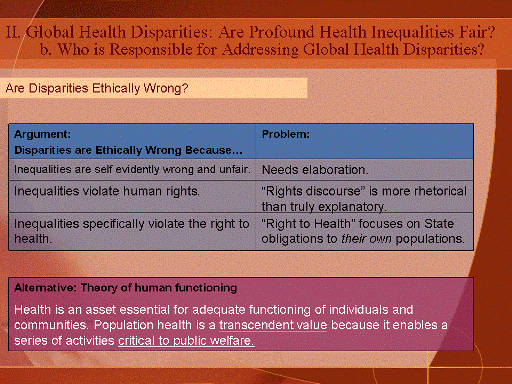Search for most updated materials ↑
| front |1 |2 |3 |4 |5 |6 |7 |8 |9 |10 |11 |12 |13 |14 |15 |16 |17 |18 |19 |20 |21 |22 |23 |24 |25 |26 |27 |28 |review |
 |
Are disparities
ethically wrong? A Theory of Human Functioning
Many scholars and activists
simply assert that global health disparities are unethical,
suggesting that inequalities are self-evidently wrong or that they
violate fundamental human rights. But, stating that inequalities are
unfair, without more, does little to explain why it is so. Nor is an
appeal to human rights convincing because, used in this way, “rights
discourse” is just another rhetorical device without explanatory
power. The internationally recognized “right to health,” as
explained further below, principally focuses on States’ obligations
to meet the health needs of their own populations. In any event, the
text of an international legal instrument cannot be read as a
principled ethical argument that State A owes a duty to
improve the health of State B’s population.
Perhaps the strongest claim
that health disparities are unethical is based on what I call a
theory of human functioning. Health has special meaning and
importance to individuals and the community as a whole. Health is
necessary for much of the joy, creativity, and productivity that a
person derives from life. Individuals with physical and mental
health recreate, socialize, work, and engage in family and social
activities that bring meaning and happiness to their lives. Every
person strives for the best physical and mental health achievable,
even in the face of existing disease, injury, or disability.
Perhaps not as obvious,
health also is essential for the functioning of populations. Without
minimum levels of health, people cannot fully engage in social
interactions, participate in the political process, exercise rights
of citizenship, generate wealth, create art, and provide for the
common security. A safe and healthy population builds strong roots
for a country’s governmental structures, social organizations,
cultural endowment, economic prosperity, and national defense.
Population health becomes a transcendent value because a certain
level of human functioning is a prerequisite for activities that are
critical to the public’s welfare—social, political, and economic.
Amartya Sen famously
theorized that the capability to avoid starvation, preventable
morbidity, and early mortality is a substantive freedom that
enriches human life. Depriving people of this capability strips them
of their freedom to be who they want to be and “to do things that a
person has reason to value.” Under a theory of human functioning,
health deprivations are unethical because they unnecessarily reduce
one’s ability to function and the capacity for human agency. Health,
among all the other forms of disadvantage, is special and
foundational, in that its effects on human capacities impact one’s
opportunities in the world.
|